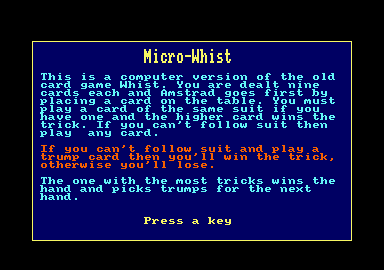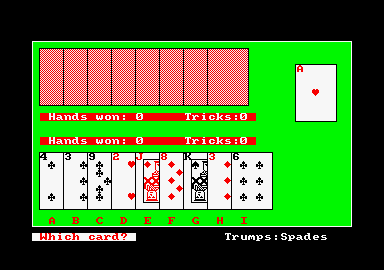 
ROLAND WADDILOVE turns his hand to playing cards WHIST is a clever simulation of the popular card game - and with a couple of tricks up its sleeve. It plays very effectively, but if you put your mind to it you could come up trumps. The object is to win more tricks than the Amstrad. You take it in turns to play a card and the player with the highest takes the trick and gets to play the next card. You must always play a card of the same suit that your opponent led with - unless you don't have one, in which case you can play anything you like. At the start of a game one of the players selects a suit which will be used as trumps. Cards of this suit then beat any other, no matter what their value. So, if you can't follow suit and have a trump card, play it and you'll win the trick. The first person to win five games wins the match. The program plays a strong game so here are some general strategies you can follow to improve your chances: - If you are playing first and have some high trumps, try using those before the rest. This will force your opponent to play his trumps and, hopefully, he'll run out before you. This strategy leaves you free to play your other suits with little or no fear of being trumped.
- If you can't play a higher card than your opponent, always play your lowest in the same suit. If you don't have one. select your least useful card.
- An exception to this is when you are trying to trick your opponent into thinking that you only have one of a particular suit left. In this case you could play your highest card.
- When choosing trumps, if there (doesn't seem to be much difference between the suits, add up the values of the cards giving 2 points for a two, 10 for a ten and so on, and then 11,12, 13 and 14 for Jack, Queen, King and Ace. Choose the suit with the highest total - if there is no difference in the A results, just pick at random.
- If you win two tricks in a row using the same suit (and it isn't trumps) don't push your luck by trying the same suit again unless you have to, or your opponent has no trumps left. The reason is that you start with nine cards in your hand and the most likely spread will be two cards from three of the suite and three cards from the fourth.
- Remember which cards have gone!
All that remains is for you to type in the listing and then it's your deal! If you have any problems, pinpoint your typing mistakes using the checksums in conjunction with the checksum utility in the June 1987 issue. CWTA |

